




 |
   |
 |
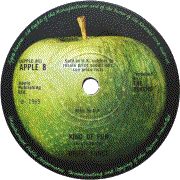 |
7" (1970) ***/TT½ King of Fuh Nobody Knows |
Current availability:
Mellotron used:
Brute Force was a pseudonym for New Yorker Stephen Friedland, rather than a band proper, although I'm filing them/him under 'B' rather than 'F'. Friedland apparently now slightly regrets taking a pseudonym, although it's better than his original 'Krude Brute'. Anyway, he managed to get a tape of King Of Fuh to a Beatles associate, who played it to George Harrison, who loved it; George tried to get it released on EMI, but when they declined, George had it privately pressed in a small run, available only via mail order (and later privately released by Friedland himself). Why did EMI decline? Well, you've probably pronounced the title as 'foo'. Wrong. Try 'uh' as in 'but', or 'gun'. Or indeed, 'fuck'. Try the chorus for size:
| 'And the Fuh King did what he wanted to do, The Fuh King went where he wanted to go, Mighty, mighty Fuh King, All hail the Fuh King'. |
Friedland explains it thus:
| I didn't accept the censorship and language taboo and sought to open the mass megalithic mind even a millimeter more. Yet the same entrenched fear was inside the mind and hearts of the radio program managers, a fear not of the melody, more with the lyrics (although the lyrics have nothing to do with sex, only with the Beauty of the world and Individuality), but the awesome fear which grips a human being upon looking at the sky and envisioning one's place in the universe and also the fear of leaving one's pigeonhole job and standing in the unemployment line. |
Yes, Stephen. Or maybe it was simply a juvenile attempt to get the work 'fucking' onto the radio. it's a shame, actually, as the song's a pretty good Beatlesesque psych-pop number, although the lyrics scan abominably, even when Friedland wasn't trying to get around the 'censorship and language taboo'. It's also layered in Mark II Mellotron strings and has a neat major-to-minor shift after the chorus. It was, of course, consigned to almost immediate obscurity, although it's now finally easily available as a bonus track on both 2001's Tour De Brute Force and 2004's expanded reissue of his second album, Extemporaneous. The latter's basically a recording of his live cabaret show, in front of a small invited audience in New York. It's terrible, as you might've guessed; World manages to repeat the word 'bullshit' about 987 times [yawn]. It seems unlikely that there's any more Mellotron on any of Friedland's work; although King Of Fuh is in some ways a nice track, the infantile lyrics tend to rather put me off. Pity.
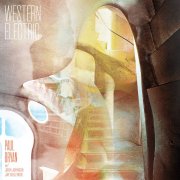 |
Western Electric (2024, 39.28) ***/½ |
|
| Ethervane Family Man Jazz Bass Berlin Pascoal's Wager workingthankyousolid! Mise en Abyme Bon Jemmott |
Respira Lento August and the Colonel Black Rook |
|
Current availability:
Mellotron used:
Paul Bryan is a noted producer and musician, particularly in his long-term working relationship with the wonderful Aimee Mann. His first solo album, 2003's Handcuff King, is thoroughly obscure—it isn't even mentioned on his own website—but he's promoting his fourth and latest, 2024's Western Electric. It is, essentially a free jazz record—track three, Jazz Bass, has a double meaning—so your appreciation of it will be tied to your tolerance for squalling sax and (Bryan's) bass-led compositions.
Bryan plays his own cycling Streetly M4000 Mellotron, if only just, with what sounds like heavily-delayed solo trumpet at the end of Mise En Abyme, complete with pitchbend. As you can see below, he's used an awful lot more Mellotron (and Chamberlin) on other people's records.
See: Merrie Amsterburg | The Both | Dennis Brennan | Jeremy Cunningham | Jessica Fichot | Lindsay Fuller | Jeffrey Gaines | Jenny Gillespie | Grey Eye Glances | Norah Jones | Jennifer Kimball | Rachel Loshak | Ashley MacIsaac | Aimee Mann | Nina Nastasia | Carol Noonan | Ellis Paul | Pierson, Parker, Janovitz | Spooky Ghost | Tanita Tikaram | Martha Wainwright | Kenny White | Tess Wiley | Forever Dusty: A Tribute to Dusty Springfield
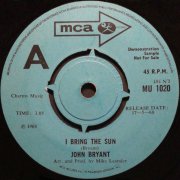 |
7" (1968) ***/TT½ I Bring the Sun Columbine |
Current availability:
Mellotron used:
John Bryant hailed from the unprepossessing environs of Tooting, South London, releasing a handful of singles and an album between the late '60s and early '70s, before disappearing back into obscurity. 1968's psych-lite I Bring The Sun was his third 7", a decent-if-unstartling effort, typical of the time, backed with the mildly jaunty, Beatlesesque Columbine.
The single was produced by future Gary Glitter collaborator Mike Leander; don't hold it against him, he's the originator of the genuinely avant-garde guitar sound used on Glitter's early sides... It may or may not be him on the Mellotron, with background flutes on the 'A', a really full-on string part entering the fray halfway through, plus brass (trombones?) on the flip. This can be found on Elastic Cat's We All Live on Candy Green or, of course, YouTube.
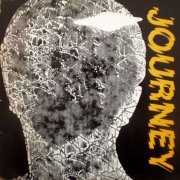 |
Journey (1979, 43.36) ***/TTTJourneyAnnalia Dream Solitude I Know the Time Jesus Christ |
Current availability:
Mellotron used:
Francesco Buccheri specialised in a rather un-Italian form of electronic music, but, I'm afraid to say, he was never going to be one of the genre's front-runners. It's not that Journey is bad, exactly, just that it isn't particularly good, either. The side-long title track is rather bitty and disjointed, sounding more like several shorter tracks nailed together in a rather unharmonious way than one cohesive piece, while much of side two's material doesn't really stand up, especially Jesus Christ, a rather poor attempt at a 'proper song'. There are other musicians on the album, including a drummer who crops up here and there, while, although he's not credited as such, I presume the occasional vocals are by Buccheri too (both are present and incorrect on the final track).
Sorry to be so harsh, but I've heard a great deal better in this area and my listening pleasure wasn't particularly enhanced by such a dodgy transfer to CD that at several points, it sounds like the tape slipped, or even that it was transferred from a vinyl copy with an off-centre hole. Anyway, Buccheri's Mellotron work seems to be exclusively choir, usually mixed with string synth, with a strong presence on every track except Solitude. Saying that, it's mostly quite background work and decidedly unambitious, leaving the album with only three Ts.
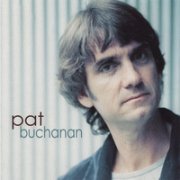 |
Pat Buchanan (2003, 34.46) ***/T |
|
| You Lose Luckiest Girl Smile on My Face The World is Flat Under the Sun Love Goes Up in Smoke Insects and Angels The Longest Day |
Glass Don't Forget to Write |
|
Current availability:
Chamberlin used:
Pat Buchanan writes McCartneyesque pop in the grand tradition on his eponymous third album, sometimes slipping into a 1940s groove, not least on opener You Lose and the strings-laden Glass. Highlights? Luckiest Girl, Under The Sun, the propulsive Love Goes Up In Smoke and sentimental closer Don't Forget To Write, maybe.
Brad Jones plays what sounds like real Chamberlin, with background flutes on You Lose, one of the brass variants (and strings?) on The World Is Flat and upfront strings on Under The Sun, although the strings on Glass sound real. But is You Lose based on a rhythm tape from one of the earlier machines, I wonder? Difficult to say, without knowing much about Chamberlin rhythm tapes. One for Macca fans, then.
Incredibly out of date official site
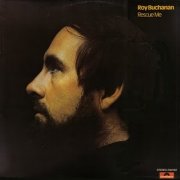 |
Rescue Me (1974, 34.11) ***½/TRescue MeI'm the Ram In the Beginning CC Ryder Country Preacher You're Killing My Love She Can't Say No Wayfairing Pilgrim |
Current availability:
Mellotron used:
Roy Buchanan is one of those tremendous guitarists whose appeal has never really exceeded 'cult' status; after his earlyish death in 1988, aged forty-eight, he's unlikely to now, sadly. His fourth solo album, 1974's Rescue Me, consists of his usual brew of soul and blues, concentrating on the latter, all infused with his truly exceptional Telecaster tone (we're talking about the man who effectively invented the 'pinched harmonic' here). If you're of a 'prog or die' disposition, you're probably not going to like this very much, but it does what it does perfectly, better tracks (at least to my ears) including In The Beginning and the slow, mournful blues of Wayfairing Pilgrim [sic] that closes the record.
Although Ken Freeman, inventor of the Freeman String Symphonizer, one of the first (the first?) string machines, is credited with keyboards, he plays Mellotron on Wayfairing Pilgrim to good effect. This isn't an album for the Mellotron obsessive, but its sole Mellotron track is worth hearing if you're going to buy the album anyway. Incidentally, thanks to Tilo for making me aware of its Mellotronic credentials.
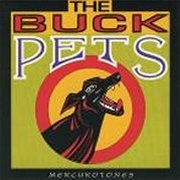 |
Mercurotones (1990, 40.06) ***½/T |
|
| Moon Goddess Pearls P.M. Some Hesitation Five o'Clock or Thursday (Up to You) Avenue F Blues Libertine Ready to Break |
Shameless Brother (Take These Dreams) Guilty Hey Sunshine |
|
Current availability:
Mellotron used:
Popular wisdom has it that Texans The Buck Pets were a few years too early for their own good; who'd be an innovator, eh? They were playing 'alternative rock' in the late '80s, but weren't picked up on when it broke worldwide in the early '90s, by which time they were disintegrating. The usual influences they're assigned include Hüsker Dü and The Replacements, the same bands that were being quoted not so long after by Nirvana, Pearl Jam, Stone Temple Pilots et al. I have to say, however, that their second album, 1990's Mercurotones, is far more appealing than anything I've heard by any of those bands bar Nirvana, who were in a different league anyway. Best tracks? Probably the acoustic Some Hesitation, Five O'Clock Or Thursday (Up To You) and the cello-driven Ready To Break, but there's nothing here that either bored or offended me, which is quite a trick in itself.
Someone plays Mellotron on a couple of tracks, the most likely candidate being producer and M400 owner Michael Beinhorn (Liquid Jesus, Soundgarden, Chili Peppers etc. etc.), with a string part on Five O'Clock Or Thursday and less of the same on Brother (Take These Dreams). So; a formative kind of '90s album before the '90s had really got going, with plenty of energy and a little Mellotron. Could be a lot worse. Oh, and their frontman is my namesake (albeit preferring Andrew), the first time I've come across another one on this site.
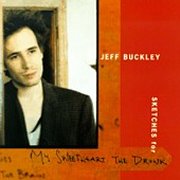 |
Sketches for My Sweetheart the Drunk (1998, recorded 1992-97, 97.32) ****/T |
||
| Sky is a Landfill Everybody Here Wants You Opened Once Nightmares By the Sea Yard of Blonde Girls Witches' Rave New Year's Prayer Morning Theft |
Vancouver You & I Nightmares By the Sea New Year's Prayer Haven't You Heard I Know We Could Be So Happy Baby (if We Wanted to Be) Murder Suicide Meteor Slave |
Back in N.Y.C. Demon John Your Flesh is So Nice Jewel Box Satisfied Mind |
|
Current availability:
Mellotron used:
You all know the tragic Jeff Buckley story, of course; son of Tim, but barely knew him, released classic debut Grace (****), died idiotically before putting out a follow-up. What a waste. Well, if Sketches for My Sweetheart the Drunk (he'd stated that his second album would be titled My Sweetheart the Drunk) is 'merely' a bunch of demos and outtakes... The guy had talent by the bucketload and should've had a long and honourable career, not blown it by drowning in a Mississippi tributary fifty years before his time. Sketches... isn't all great, by any means, but there's more good material here than on many far more established artists' regular albums. I'll leave it to others, more tuned into what he was doing, to review this properly, just to say that if you're into songs, as against excuses for a tune, you won't go too far wrong here.
I'm not 100% sure exactly how many tracks feature the mighty Mellotron; there's absolutely no doubt about New Year's Prayer, with the unknown Mellotronist (Buckley?) switching between flutes and strings throughout the track (you can actually hear the heads shifting between sounds in places), but there may also be some on Everybody Here Wants You, with cellos and strings in the mix, though it's difficult to say if they're Mellotron or generic samples. Either way, one in-your-face Mellotron track and one possibility. Difficult to recommend on the Mellotron front, but difficult not to for everything else. Incidentally, watch for disc two's demo version of Genesis' Back In N.Y.C.
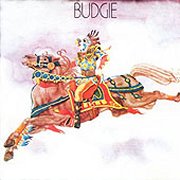 |
Budgie (1971, 40.40) ****½/½GutsEverything in My Heart The Author Nude Disintegrating Parachutist Woman Rape of the Locks All Night Petrol You and I Homicidal Suicidal |
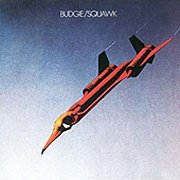 |
Squawk (1972, 38.58) ***½/TTTWhisky RiverRocking Man Rolling Home Again Make Me Happy Hot as a Docker's Armpit Drugstore Woman Bottled Young is a World Stranded |
Current availability:
Mellotrons used:
Budgie were and for that matter are again, a hard rock trio from south Wales, a heavily industrial area conducive to such goings-on (see: Birmingham). Unlike most of their brethren, however, they had a sense of humour; many of their song titles have become legendary, not to mention their bizarre lyrics. Sadly, their chief claim to fame these days is being multiply covered by Metallica on various b-sides and EPs; believe me, they're worth more.
Although vocalist/bassist Burke Shelley is also credited with 'Melotron' (anyone would think the instrument's name wasn't prominently displayed on its casing...), there is very little to be heard on their eponymous debut. In fact, the only discernable Mellotron is a couple of sustained string chords, well down in the mix, on the superbly-titled Nude Disintegrating Parachutist Woman. The album as a whole is seriously riff-based hard rock, something slightly like a bluesier Black Sabbath, but without the cod-Satanism. The production is awful; it actually varies from track to track, with an appallingly sludgy guitar sound that does the band no favours whatsoever. For all that, it's a great album; if early-'70s UK hard rock's your bag, get it.
By Squawk, Budgie really went to town with the Mellotron. Oddly enough, there's absolutely no credit for it on the sleeve, but it's probably safe to assume that Burke Shelley did the honours again. Some 'clicky' flutes on Rolling Home Again and brass and strings on Hot As A Docker's Armpit are all well and good, but on Young Is A World they go completely over the top. This is a full-blown Mellotron epic, no less, strings everywhere you look and well worth the ear of any Mellotron fan. Overall, the album's similar to their first, although I personally feel that the songs aren't up to scratch in comparison.
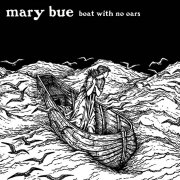 |
Boat With No Oars (2007, 60.02) **½/T |
|
| Ain't Nobody No Turning Back Salt and Pepper Gorgeous West is the West My Sweet Warrior The City Trees Baby I Love You |
Chocolate and Hawaii Petunias The Retina Suitcase Full of Feathers Waltz Big Mistake Cypress Tree |
|
 |
|
| Mary Bue at the Third Ear M1 | |
Current availability:
Chamberlin used:
Minneapolis' Mary Bue is a singer-songwriter of the piano (as against guitar) variety, whose fourth album, 2007's Boat With No Oars, sails too close to the indie mainstream for this listener's liking, less tiresome tracks including West Is The West and Big Mistake.
Bue plays Minneapolis' Third Ear Recordings' Chamberlin M1, with big, chordal strings on Gorgeous, although, sadly, that's our lot. Not only is this boring, but it's boring and overlong, although its lone Chamby track is worth hearing, if only for that reason.
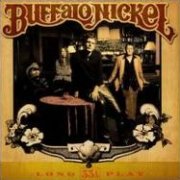 |
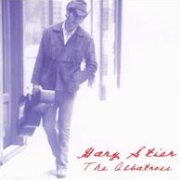 |
Long Play 33⅓ [a.k.a. The Albatross, by Gary Stier] (2000/2002, 58.02) ***/T½ |
|
| This Ain't Nowhere Fool Enough Miss America and I Good Day Coming Up Roses Stayed Ragged Out Heart Evil Wind |
What You Don't Need Tied to the Tracks One Man's Ceiling Let it All Come Down [Stier version adds: All My Fault] |
||
Current availability:
Mellotron/Chamberlin used:
Here's a slightly confusing one: Buffalo Nickel (named for an iconic version of the 5¢ piece)'s debut album, Long Play 33⅓, was subsequently reissued two years later as The Albatross, by their then-ex-vocalist Gary Stier, (almost) same tracklisting and all. It's got a very Tom Petty/John Mellencamp sound about it, so it's no surprise at all to find out that Heartbreakers Mike Campbell and Benmont Tench play on the record, along with Kenny Aronoff from Mellencamp's band and workaholic Jayhawk Gary Louris. It's not a bad record, but given that better practitioners of the style are still working, it seems a slightly pointless one, which I'm sure is missing the point. C'est la vie. Heartfelt plea: a few tracks of this stuff is fine, but a whole (long) album really starts to drag after a while. Best track? Probably closer Let It All Come Down, largely because it's a bit rockier.
Joey Huffman plays Mellotron, while Benmont Tench does his usual Chamberlin thing, although there's not a great deal of either to be heard here, I'm afraid. Faint string parts (presumably Mellotron) on Miss America And I and Ragged Out Heart, while the (presumably) Chamby strings on What You Don't Need are far more full-on, although that would appear to be it. Given that this is a) on a major label and b) still available, howcum Stier's managed to re-release it under his own name? It's got one extra track (All My Fault), although the original's got a vastly better sleeve, as you can see above. I'd be interested to know the full story behind this. Buffalo Nickel seem to have carried on, presumably without him, releasing at least two later albums. All most intriguing.
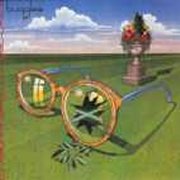 |
Adventures in Modern Recording (1981, 33.43) ***½/TAdventures in Modern RecordingBeatnik Vermilion Sands I am a Camera On TV Inner City Lenny Rainbow Warrior |
Current availability:
Mellotron used:
After their huge hit with Video Killed The Radio Star and its associated LP, The Age of Plastic, not to mention their ill-advised teaming-up with Yes for their Drama opus, Trevor Horn and Geoff Downes retreated into the safety of their original outfit, producing a rather less pop-friendly album in Adventures in Modern Recording. It's a clever, assured album, if without an obvious hit, ultimately doomed. After its failure, Horn went into production, of course (Yes, Frankie Goes to Hollywood), while Downes co-formed the appalling Asia with Yes' Steve Howe.
Musically, there are some definite points of interest: Horn does a pretty good Jon Anderson on Lenny, proving he'd learnt something from his Yes experience, while I Am A Camera is a re-write of Into The Lens from Drama, though I'd say they were probably better when doing their own thing. The only obvious Mellotron parts on the album are the choirs on Vermilion Sands (yeah, yeah, Ballard reference) and the title track, but even then, they're pretty low-key. So; not bad, not great, little Mellotron. Of its time.
See: Asia | Yes | Bruce Woolley
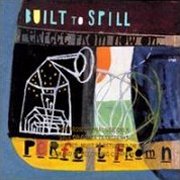 |
Perfect From Now on (1997, 54.16) ****/TTRandy Described EternityI Would Hurt a Fly Stop the Show Made-Up Dreams Velvet Waltz Out of Site Kicked it in the Sun Untrustable Part 2 (About Someone Else) |
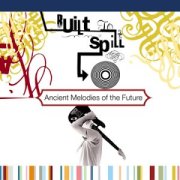 |
Ancient Melodies of the Future (2001, 39.16) ****/TTT |
|
| Strange The Host In Your Mind Alarmed Trimmed and Burning Happiness Don't Try You Are |
Fly Around My Pretty Little Miss The Weather |
|
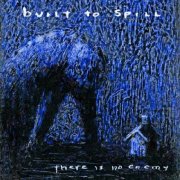 |
There is No Enemy (2009, 55.33) ***½/T |
|
| Aisle 13 Hindsight Nowhere Lullaby Good Ol' Boredom Life's a Dream Oh Yeah Pat Done |
Planting Seeds Things Fall Apart Tomorrow |
|
Current availability:
Mellotrons used:
Built to Spill are difficult to describe, not least due to having changed their style from one album to the next. 1997's Perfect From Now on sounds to my ears like a cross between Neil Young and the more interesting end of '90s US indie stuff, with a sometimes unpredictable and (dare I say it?) almost progressive approach to their song structures; there are certainly a couple of lengthy tracks on the album, although, of course, that's not necessarily any indicator of a 'progressive' outlook (see: The Allman Brothers). Most of the songs are also suffused with the same kind of melancholy as, say, Low, although BtS are a far 'rockier' proposition all round. Highlights? Stop The Show shoots off at a tangent a couple of times, just to keep things interesting and Velvet Waltz is a classic 'slowburner', but there isn't actually a bad track to be heard here. Robert Roth's Mellotron (and yes, it's real) appears on three tracks, with considerable string use on Made-Up Dreams and Velvet Waltz, although there's less on lengthy closer Untrustable Part 2. BtS have even been known to use Mellotron live, but I'm not even sure if the band are still together at this point.
The band released an excellent live album, er, Live (****), in 2000, finally following Perfect From Now on with Ancient Melodies of the Future in 2001. There seems to've been another minor stylistic shift, with even fewer upbeat tracks, while the album isn't as 'immediate' as its predecessor, although it's quite clearly a good record. There's no Mellotron actually credited and, with two different keyboard players involved, it's hard to tell who's doing what. Sam Coomes guests on three tracks, so it's possible he plays the Mellotron parts on Alarmed and The Weather, while band mainman Doug Martsch plays the rest, with strings/cellos on The Host, pitchbent strings on In Your Mind and Alarmed and flute parts on Fly Around My Pretty Little Miss and The Weather. I'm not 100% convinced that all the string parts are actually Mellotron, while what sounds like E-bowed guitar on Trimmed And Burning I initially took to be Mellotron strings, but it seems that most of the album has at least a little Mellotronic input.
BtS didn't use a Mellotron for another eight years, until 2009's There is No Enemy. It's a perfectly respectable album, but also a rather unexciting one, most of its tracks dragging on longer than necessary. Look, guys, Neil Young can get away with it and you can onstage, but this is an album, OK? The record certainly has its moments (Nowhere Lullaby, closer Tomorrow), but could have done with being fifteen minutes shorter. Coomes alone plays Mellotron this time round, but not a lot... He's credited on one track, with under a minute of strings on Done, although Tomorrow also features a string part that's quite clearly Mellotron-generated. Not a bad album, then, but nowhere near a great one, either. n.b. Brian tells me that they used a real M400 live as recently as 2009, making it highly likely that the Mellotron on that year's album is real.
See: Samples etc. | Robert Roth
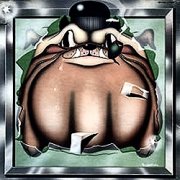 |
Smasher (1974, 33.07) **/T |
|
| Flamingo Are You Really Happy Together Honeymoon Couple Bad Bad Girl Brown Eyed Handsome Man We All Had a Real Good Time Ooh When You Smile Rock'n'Roll Hootchie Coo |
I Tip My Hat I Tried to Sleep |
|
Current availability:
Mellotron used:
Bulldog formed in 1971 from the ashes of The Rascals, apparently surprising people by not sounding like that band; odd, given that they didn't even share a vocalist. Why would they? Anyway, their debut, 1972's Bulldog, is the kind of album that can only be described as 'rock'; not especially heavy, certainly not at all progressive, not really... anything. This sounds like a jumped-up bar band with a couple of 'names' who got lucky, then couldn't quite decide what musical path to follow.
Their second (and last) effort from two years later, Smasher, is even less 'rock' than its predecessor, opening with several quiet numbers, while the rockier tracks are pretty half-hearted, as you'd expect. John Turi plays Mellotron, with flutes on opener Flamingo and closer I Tried To Sleep, bookending the album, although the strings on a handful of tracks appear to be real; the chord at the end of Honeymoon Couple definitely holds too long to be Mellotronic. All in all, a pretty disappointing effort, to be honest, with so little definite Mellotron that purchase on those grounds, especially of an out-of-print item, would be futile.
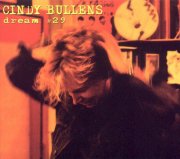 |
Dream #29 (2005, 51.35) ****/T |
|
| Oriental Silk Jellico Highway Box of Broken Heart Paper & Glass Dream 29 (One True Love) Mockingbird Hill 7 Days |
This Ain't Love Too Close to the Sun Love Letter From Las Vegas January Sky |
|
Current availability:
Mellotron used:
Cindy (now Cidny) Bullens began her career in the mid-'70s, working with Elton John (who guests here), amongst others, releasing two album towards the end of the decade. Reappearing in 1989, she's released records sporadically since, including 2005's excellent Dream #29. Think: an updated female Dylan with extra added rock'n'roll and a great voice. Highlights? It's all good, but opener Oriental Silk, Jellico Highway and Mockingbird Hill stand out, as much for their lyrics as their music.
I believe it's Bullens who plays the repeating Mellotron flute line on opener Oriental Silk, wobbly and inconsistent enough to have that air of authenticity about it. It's hardly the album's defining feature, though; if great songwriting in the American tradition's your bag, give this a listen.
 |
Lookaftering (2005, 35.37) ****½/T |
|
| Lately Here Before Wayward Hidden Against the Sky Turning Backs If I Were Same But Different |
Brother Feet of Clay Wayward Hum |
|
Current availability:
Mellotron used:
Until 2002, Vashti Bunyan (descendant of John) resided, seemingly permanently, in the 'where are they now?' file, having left behind one perfect album in 1970's gorgeous Just Another Diamond Day (*****), subsequently disappearing into obscurity. The much-fêted Devendra Banhart helped her reappear in the whatever-we're-calling-this-decade, with her second album, Lookaftering, appearing in 2005, thirty-five years after her debut. Was it worth the wait? Oh yes... It's hard to say at this stage whether it's quite as good as ...Diamond Day, but Vashti's gentle, intimate voice remains almost unchanged, along with her beautiful songs; a female Nick Drake, anyone? I think it'll take more listens than I have time to give this now for its charms to become fully apparent, so I'm not even going to try to pinpoint highlights, only to say that this is one of the most stunning singer-songwriter albums you'll hear all year, or probably decade.
Producer Max Richter plays keyboard, wind and percussion instruments on the album, including Mellotron on three tracks. Against The Sky and Turning Backs have sublime flute parts that could almost have been played by a real one, with the latter juxtaposing it against a cor anglais, plus what I take to be a very background flute part on Feet Of Clay, as there's nothing else obvious on the track. Real? It's hard to tell, but I'm inclined to leave this here, at least for now. Anyway, you shouldn't be buying this for its fairly low Mellotronic content, but for its pastoral beauty and because Vashti Bunyan needs to be welcomed back. Quite beautiful.
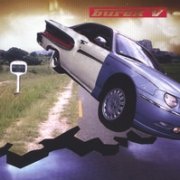 |
Burek V (2003, 45.09) **/½ |
|
| Intro Fa Fa Fa Found Out Heliocentricity Too Happy Now New Beginning Amsterdam Carry No Evil |
Psychedelics Two Strings Yesterday's Parties Cover Your Tracks Singled Out Blues |
|
Current availability:
Mellotron used:
I know so little about Burek V that I can't even tell you whether it's 'V' as in the twenty-second letter of the alphabet, or as in the Roman 'five', although, for what it's worth (often, not that much), Discogs list their eponymous 2003 effort as their first of two albums, their last release being in 2005. Burek V is, I'm sad to report, an utterly dreary indie album, at its least tedious on Cover Your Tracks, although the bluesy acoustic slide work on closer Singled Out Blues almost makes for a decent song.
Tom Hakava (Ben's Diapers, Witchcraft) plays (presumably) his own Mellotron on Two Strings, with a brief, upfront, wobbly chordal flute part, although the strings on Heliocentricity sound like an old string synth.
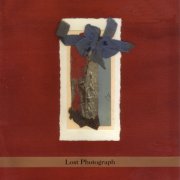 |
Lost Photograph (2002, 45.27) ***½/T |
|
| Inzihuat The Couch Episode Below Delancey Sleepless Bandit Linguist From Latvia Dem Monatstrishter Rebin's Chosid'l Arturo, the Aqua Boy Mem |
Aveenu Malkenu Constantinople Ringling Kid Youkali Storyteller The Cantor and His Grandson |
|
Current availability:
Mellotron used:
Long Islander Rob Burger's Lost Photograph has been described as 'very Jewish' and that's by a website called Klezmershack, so I think they know what they're talking about. It's actually a ripe mixture of klezmer and other East European Jewish styles, allied to anything and everything that Burger could lay his hands on, musically speaking. The album's cohesiveness in the face of considerable diversity is aided and abetted by Burger's accordion, present on most tracks, giving the whole an almost pre-war air in places.
Burger plays Chamberlin, with, er, something on Storyteller, along with strings. Woodwind? Very hard to tell, but it's clearly coming from a tape-replay instrument. So; something a little different for this site... Lost Photograph is clearly very good at what it does, which is pretty unique, something that almost invariably gets brownie points 'round these parts. One decent Chamby track, but I doubt whether that'll tempt any but those of you who like the sound of Burger's thang anyway.
See: Faun Fables | Oranj Symphonette | Great Jewish Music
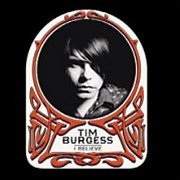 |
I Believe (2003, 36.34) **/½ |
|
| I Believe in the Spirit Held in Straps Only a Boy We All Need Love Oh My Corazon Be My Baby Years Ago Say Yes |
Love to Spend the Night Po' Boy Soul All I Ever Do |
|
Current availability:
Mellotron used:
Tim Burgess is vocalist for The Charlatans, running a solo career concurrently with that of the band since the early 2000s. The first fruit of his solo work was 2003's I Believe, where Burgess lets his obvious love of American soul and R&B run riot, the end result being a deeply unappealing mélange of styles at the lighter end of the Charlatans spectrum, although I shall grudgingly admit that his voice does actually suit the material.
Roger Joseph Manning, Jr. played Mellotron, if barely, with a flute part on We All Need Love that sounds like it could even be genuine, in which case it would be more so than most of the music on offer here. Avoid.
See: The Charlatans
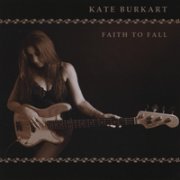 |
Faith to Fall (2010, 41.57) **½/T |
|
| The High Road Better Then The Most Witness Cross the Street Parallel Universe Shades of Gray State of Grace |
Far Away Here Destined Faith to Fall |
|
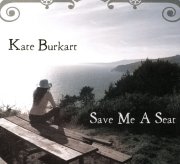 |
Save Me a Seat (2015, 22.07) ***½/T½Save Me a SeatEnough Misery & Music Lost & Found The Simple Things Smells Like Candy |
Current availability:
Mellotrons used:
Kate Burkart's Faith to Fall doesn't appear to be a Christian album, which is a bonus, although its gentle-end-of-Americana thing loses its appeal after a few tracks. Any highlights? Opener The High Road, the drone-friendly Cross The Street and Destined, perhaps. Matt Henry Cunitz plays his M400 on Parallel Universe, with a clearly genuine string part, as upfront as you like. Sadly, I really can't think of anything much else to say about this, although I have to note that Burkart's lyrics are largely above-average, which makes a nice change.
Five years on, her Save Me a Seat EP is a major improvement, stripping out the also-rans, leaving a solid core of great songwriting, at its best on the opening title track, Enough and slowburn closer Smells Like Candy. Cunitz on Mellotron again, with a simple, yet effective string part (under real violin) on The Simple Things and clunky vibes on Smells Like Candy. Now, this one's worth hearing.
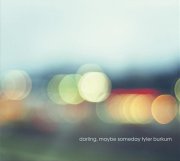 |
Darling, Maybe Someday (2008, 38.20) **½/T |
|
| Blue as the Sky Gales of November California Hurricane I Need Your Love Carry You With Me Beauty Moving |
Everything You Said Too Far Gone You're on My Mind End of the Road |
|
Current availability:
Mellotron used:
Tyler Burkum sounds like he should be a full-blown country dude, but is actually a rather drippy singer-songwriter with an occasional country edge. 2008's Darling, Maybe Someday isn't all bad, just mostly, better efforts including the Neil Young-ish I Need Your Love and forlorn closer End Of The Road, although they do little to make up for the rest of the album.
Paul Moak plays Mellotron, with a short strings solo on opener Blue As The Sky and a full-on polyphonic flute part on End Of The Road, which improve their parent songs without making much impact on the album overall. Weak singer-songwriter fare, not much Mellotron. Business as usual, then.
See: The Cactus Blossoms